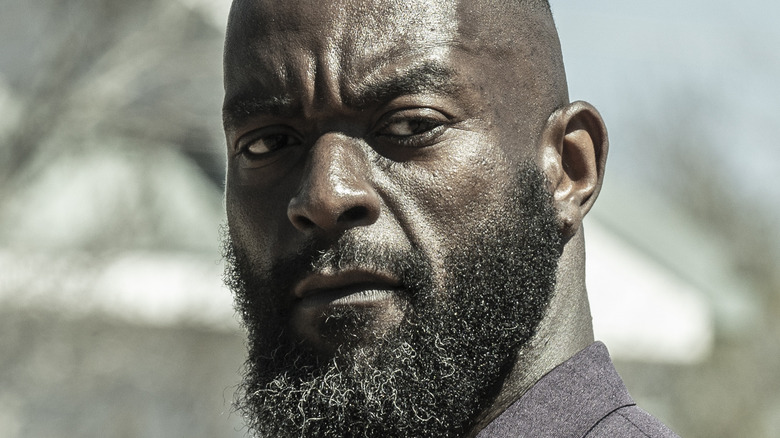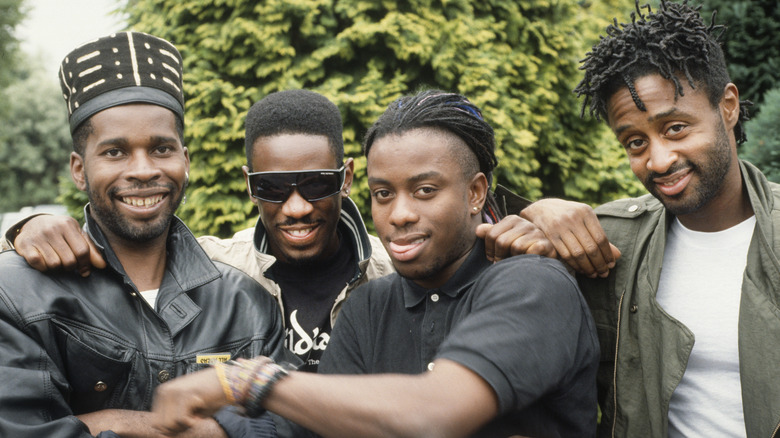What Was The Song Playing During The Walking Dead Finale's Big Explosion Scene?
Contains spoilers for "The Walking Dead" Season 11, Episode 24
If the series finale of "The Walking Dead" cemented one thing about the series — beyond the grim realization that earlier moments almost seem like they belong to a different show entirely — it's that it's hard to be a "Walking Dead" fan. It may be wholly unoriginal at this point to suggest the show "died" many years ago and now merely limps along menacingly like one of its zombified hordes, but there's simply no comparison more apt. The finale, ironically titled "Rest in Peace," offers little in the way of satisfying resolutions, instead trading in decaying memories of the past and vague threats of the future.
Certain moments stand out among the chaos. Rosita (Christian Serratos) – who first appeared during Season 4 — receives a surprisingly effective end. Her zombie bite and extended period of ailing trades in the same focus on relationships that made "The Walking Dead" effective when Rosita first joined — though it admittedly follows the last throes of the series' more nonsensical tendencies.
This includes the fiery extermination of the "variant" walkers, which offers a necessary victory for the episode that's about as punchy and meaningful as can be — for the finale that launched a thousand spin-offs, at least. The moment is underscored by a peculiar piece of music that some fans may be unfamiliar with.
A misplaced political anthem
The song playing is Living Colour's "Cult of Personality." It's an aesthetically fun choice, if a bit thematically hard to place. After choosing not to execute corrupt Commonwealth Governor Pamela Milton (Laila Robins), both sides of the conflict unite behind Mercer (Michael James Shaw) and Daryl (Norman Reedus). In an endeavor of community strength and coordination, the group blasts the song, drawing or otherwise corralling the walkers to a complex explosive mechanism that destroys them.
Its use is a small lesson in not just choosing needle drops carefully but also being conscious of the specific lyrics used and emphasized. The edit heard in the show — further hindered by bouts of diegetic distortion — fails to effectively get across anything beyond the track's eponymous refrain. Especially given the deliberate choice to end on the song's John F. Kennedy quote, it almost seems like the show is shooting for a terribly misguided literal read of the song that lauds Daryl and Mercer as a cult of good personality. However, this couldn't be further from the song's (and likely the creative team's) intent. Kennedy's quote shouldn't be memorialized or valorized — and neither should the heroes on "The Walking Dead."
What does the song say about leadership?
As the band's guitarist, Vernon Reid, said of the song's lyrics, "The whole idea was to move past the duality of: That's a good person and that's a bad person. What do the good and the bad have in common?" (via The Ringer). What connects the disparate political leaders mentioned in the lyrics is their inflated public image, an image that can be used and manipulated to posthumously absolve them of wrongdoing, rally armies to commit atrocities, or simply obscure the fact that leaders are anything more than imperfect people given immense power.
A leader is good or bad not based on their public image but based on what they do for the public. It almost works for "The Walking Dead" in that sense — it's just a shame that it requires so much extraneous research and knowledge to connect those dots. Perhaps it's impossible to get this message across clearly to new listeners, especially in such a truncated form — but then why use the song at all? It ultimately fails as an anthem of rising change and instead reads as a smirking critique of it.
Perhaps this lyrical selection is meant to be a nod to Pamela's bleak reign over the Commonwealth — a snarling eulogy for her rule. Then again, the whole moment may just be a fun, simple nod to professional wrestler and "Walking Dead" fan CM Punk, who uses the song as his entrance music and has appeared numerous times on "Talking Dead," including its finale (via 411mania.com).

